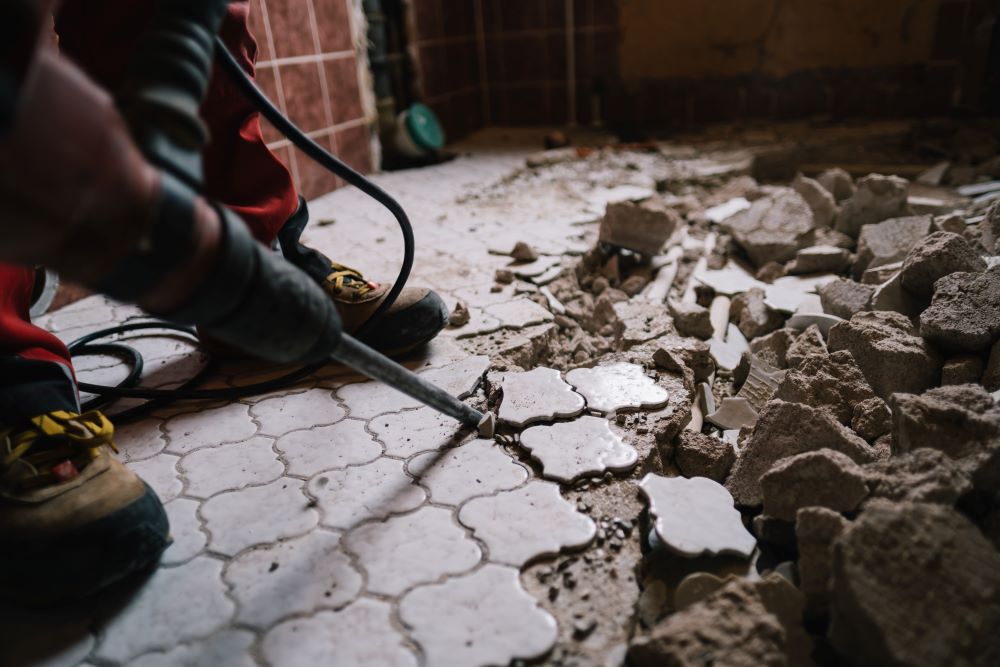
The Essential Guide to Residential Demolition Services
Knowing the ins and outs of residential demolition is essential, whether you’re a property developer with impending projects or a homeowner wishing to refurbish. The purpose of this essay is to provide you with a thorough understanding of home demolition and the crucial factors that need to be taken into account. We’ll go over things like expertise, reputation, and insurance coverage to take into account when choosing a home demolition service provider. You will have a thorough grasp of home demolition services by the conclusion of this tutorial, and you will be more prepared to handle your demolition job with success. Now let’s get going!
OUR SERVICES
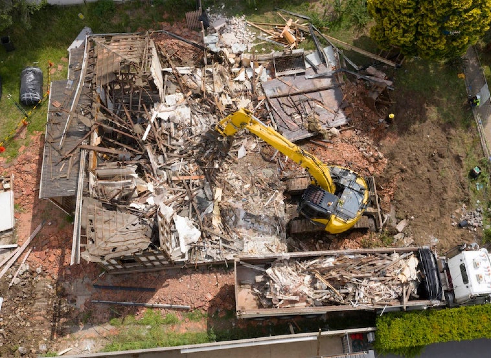
Structure Demolition. Residential, Commercial & Industrial
If your structure poses a health, safety, or environmental risk, demolition can prevent costly citations or fatal accidents. While this may seem daunting, you are just a phone call away from having your residential demolition done professionally, responsibly, and at a great price.
Talk to a Demolition Specialist Now! 916.249.5001
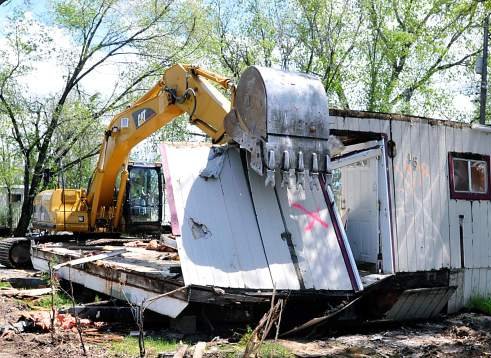
Mobile Home Demolition
We demolish and haul away mobile homes. Any size, anywhere, anyhow. We are fast, clean and competitive. We serve most of Northern California. There are many factors to consider when removing or demolishing your old trailer, mobile home, or manufactured home like: the processes involved, costs, time, contractors, debris, and permits.
Talk to a Demolition Specialist Now! 916.249.5001
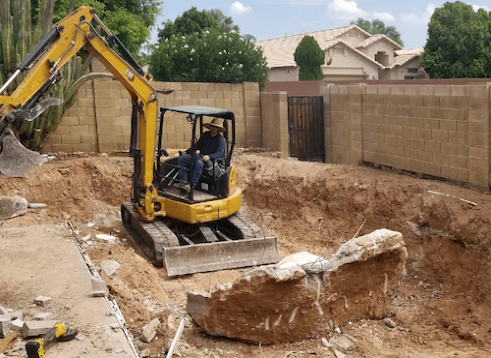
Pool Demolition
When removing a pool in Sacramento, California with the professional demolition team of Maxton Demo, you’re guaranteed peace of mind from beginning to end. From your initial request for an estimate to clean-up, you can expect our pool demolition process that’s completely professional and safe.
Talk to a Demolition Specialist Now! 916.249.5001
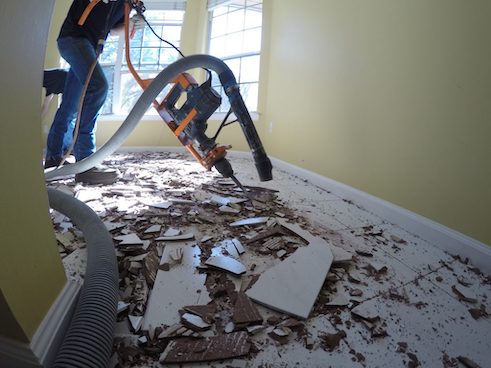
Floor Demolition
Flooring demolition, like any other major home renovation work, requires a specific set of skills and tools to be performed properly. You need experts in flooring demolition to get you the best floors possible. Contact us to find out more about how we can help you today.
Talk to a Demolition Specialist Now! 916.249.5001
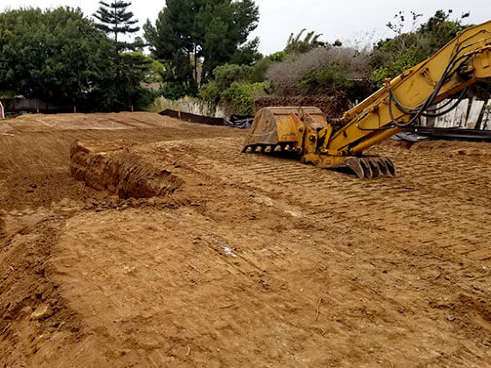
Grading & Excavating
If you need an experienced excavator and grader in Sacramento, call us today. One of the many reasons that residential, commercial, and industrial customers choose to work with us is because we’re able to provide a broad range of services to help construction-related projects get done in less time and at a reduced cost.
Talk to a Demolition Specialist Now! 916.249.5001

Roof Snow Removal
Heavy snow & ice dams can cause significant roof and home damage. Roof Snow removal is our specialty during the winter months. Serving the Sacramento, California area for 10 years, we can get your roof snow removed and promise a quick response and reasonable rates.
Talk to a Demolition Specialist Now! 916.249.5001
Project Types For Residential Demolition
The extent and complexity of residential demolition projects may vary widely, from the removal of a single building to the destruction of an entire neighborhood. Knowing the many home demolition project kinds can help you choose the best strategy for your particular requirements.
The destruction of a single-family house or a modest outbuilding, such as a shed or garage, is one of the most popular kinds of residential demolition operations. This kind of demolition is often done to provide room for future development, such as an expanded house or an entirely new kind of building. In these situations, the goal is usually to dismantle the old building as quickly and securely as possible while causing the least amount of disturbance to the surrounding region.
Multiple buildings may be demolished as part of a residential demolition project; this is common in urban regeneration and redevelopment initiatives. In order to create room for future development, these projects can include demolishing whole blocks of houses, apartment complexes, or other residential structures. To guarantee the safe and effective disposal of the buildings while minimizing the impact on the surrounding community, this form of demolition requires meticulous planning and cooperation.
Last but not least, certain home demolition projects might include the deliberate removal of particular structural components, such as a wall or a roof. When renovating or rebuilding a space, this kind of demolition is sometimes done with the intention of changing the current structure rather than demolishing it entirely. In these situations, maintaining the majority of the existing structure is prioritized above completing the intended remodeling or restoration objectives.
The Residential Demolition Process
To achieve a successful and safe end, a number of procedures in the home demolition process need to be meticulously planned and carried out. You may better plan for and guarantee the timely and effective completion of your own demolition project by being aware of the essential procedures involved in this process.
Getting the required permissions and licenses from local authorities is the first stage in the residential demolition procedure. This may include getting construction permits, demolition permits, and other relevant licenses, depending on the project’s location and size. Before starting the demolition process, it’s crucial to make sure that all the documentation is in place by collaborating closely with the local authorities.
The following stage is to do a comprehensive examination of the structure that has to be destroyed once the required licenses and permissions have been secured. This might include looking for any potentially dangerous materials within the building, including lead or asbestos, and creating a strategy for their safe removal and disposal. The evaluation may also include assessing the building’s structural integrity and determining any possible risks or difficulties that could emerge during the demolition process.
The location has to be ready for destruction when the examination is finished. This might include disconnecting services like power, gas, and water as well as removing any furniture, appliances, and other objects that need to be salvaged or disposed of. The location may also need to be protected in order to guard against unwanted entry and guarantee the security of the workforce and the neighborhood.
After the site is ready, the real demolition work may start. This might include using powerful equipment to mechanically destroy the building, such as bulldozers or excavators. On the other hand, a more targeted approach to the demolition can include using hand tools or specialized equipment to gently disassemble the building. Whichever approach is chosen, it’s critical to adhere to all pertinent safety procedures and make sure the demolition is done in a controlled and effective way.
Lastly, when the demolition is over, the area has to be cleaned up, and any trash or debris needs to be recycled or disposed of appropriately. This might include gathering and moving the waste to the proper disposal or recycling facilities using specialized machinery, including dumpsters or roll-off containers. The site can also need grading and landscaping in order to get it back to how it was or to be ready for new construction.
Equipment & Tools for Residential Demolition
A variety of specialized tools and equipment are needed for residential demolition operations in order to guarantee the job is completed safely and effectively. You can better plan for your own job and make sure you have the resources on hand by being aware of the many kinds of tools and equipment utilized in home demolition.
The excavator is one of the tools used in residential demolition the most often. Large, strong machines called excavators are employed to mechanically destroy buildings and remove debris from the site. They come with a range of attachments that may be used to remove and break down various materials, including grapples, shears, and wrecking balls.
The backhoe is a crucial piece of machinery used in home demolition. Backhoes are multipurpose tools that may be used for a range of jobs, such as clearing waste from sites, excavating trenches, and moving objects around. They often assist with the whole demolition operation when used in tandem with excavators.
Residential demolition operations often require a variety of hand tools and smaller power instruments in addition to big machines. Among other tools, they may include jackhammers, chainsaws, sledgehammers, and angle grinders. These instruments are used in more focused and deliberate demolition tasks, such as taking out certain building components or disassembling smaller buildings.
Safety gear, such as hard helmets, gloves, and protective eyewear, as well as dust control tools, including water sprayers and HEPA-filtered vacuums, are other crucial pieces of equipment utilized in home demolition. The safety of the workforce and reducing the negative effects of the demolition on the surrounding area depend on these tools and equipment.
In general, the size and complexity of the building to be destroyed, the demolition service provider’s experience and resources, and the particular needs of the project will all influence the choice of tools and equipment used in a residential demolition project. You may better plan for and assure the safe and effective completion of your own project by being aware of the many kinds of tools and equipment used in home demolition.
Safety Measures to Take When Demolitioning a Home
Projects involving the destruction of residential buildings may be risky by nature, since there are many possible risks that need to be properly controlled and reduced. It is essential to comprehend the significance of safety protocols in residential demolition to guarantee the welfare of laborers, the neighboring neighborhood, and the ecosystem.
The risk of exposure to dangerous elements, such as lead or asbestos, is one of the main safety concerns while demolishing a house. These materials may be found in older dwellings and, if not handled and disposed of appropriately, can create significant health concerns. Before starting the demolition process, it’s critical to locate and securely remove any hazardous items as part of the initial inspection phase.
The structural soundness of the structure being destroyed is another important factor in safety. Older buildings could be unstable or have undiscovered flaws that might cause them to collapse while being demolished. In order to reduce the chance of a collapse, the demolition service provider must meticulously inspect the building and create a plan for its safe disassembly. They often use specialized tools and methods for this purpose.
Residential demolition projects need to consider falling debris, dust, and other environmental risks in addition to hazardous materials and structural integrity. When dust and debris from demolition projects are not adequately controlled, they may endanger both the workers and the adjacent population. To reduce the dispersion of airborne particles, demolition service providers must use the proper dust management techniques, such as water spraying and containment barriers.
The safety of the neighborhood must also be taken into account while demolishing residential buildings, especially in metropolitan or heavily populated regions. In addition to causing noise and vibration and perhaps injuring onlookers, demolition operations may also interfere with traffic routines. To create a strategy for controlling these effects and guaranteeing community safety, demolition service providers must collaborate closely with municipal authorities.
All things considered, a thorough awareness of safety procedures and a dedication to putting the necessary safety measures in place throughout the whole project are necessary for the effective and safe completion of a home demolition project. A demolition service provider may contribute to ensuring the safety of their workforce, the community, and the environment by putting safety first.
Selecting a Skilled Residential Demolition Builder
Working with a qualified and experienced demolition service provider is crucial when it comes to home demolition operations. A demolition job may be risk- and challenge-filled or successful and safe depending on who you choose to do the work.
The degree of experience and knowledge a home demolition service provider has is among the most crucial things to take into account. It’s crucial to take into account the contractor’s communication and project management abilities in addition to their expertise and qualifications. A competent demolition service provider should be able to walk you through the steps of the procedure, provide you with a thorough estimate and schedule, and communicate with you at every stage of the undertaking.
Lastly, it’s critical to take the contractor’s dedication to environmental responsibility and safety into account. Seek out a contractor with a solid safety record who follows all safety procedures and equipment and who has a strategy in place for the recycling and responsible disposal of demolition debris.
Your demolition job may be handled safely, effectively, and in compliance with all applicable laws and standards if you take the time to thoroughly consider your options before choosing a home demolition service provider. In the long term, this may save you hassles, money, and time.
A Look at the Costs of Residential Demolition
The size and complexity of the building being destroyed is one of the main factors influencing the cost of residential demolition. In general, the cost of demolishing larger residences or multi-story buildings is more than that of smaller, single-story buildings. The existence of distinctive architectural elements or the need for more sophisticated demolition methods may further raise the project’s total cost.
The demolition project’s location is a crucial factor in determining costs. Additional safety precautions and traffic management may be necessary for demolition work in metropolitan or heavily populated locations, which might raise the total cost. Similar to this, as transportation and disposal costs may add up, the distance to the recycling or disposal sites for demolition debris can also affect the final cost.
Apart from the upfront fees of the demolition process, many additional costs need to be included when creating the total budget. These might include the price of securing the requisite licenses and authorization, the price of any necessary cleanup of hazardous chemicals, and the price of repairing the site after destruction.
Working closely with a competent demolition service provider may assist in controlling the expenses of a home demolition project by providing a precise estimate of projected expenditures and identifying strategies to optimize the project budget. This might include looking for ways to recycle or reuse demolition debris in addition to finding methods to expedite the process and reduce waste.
All things considered, the cost of a home demolition project may play a big role. However, these expenses can be controlled, and a good, budget-friendly result can be achieved with careful preparation and the correct contractor. Homeowners and property developers may prepare for a successful demolition project and make educated choices by being aware of the many financial concerns involved.
Environmental Factors in the Demolition of Residential Buildings
Environmental effects from residential demolition projects may be substantial; therefore, it’s critical that both homeowners and demolition service providers be aware of these effects and take the necessary precautions to minimize any unfavorable effects.
The possibility of hazardous materials, including asbestos or lead-based paint, leaking into the environment during residential demolition is one of the main environmental concerns. The demolition service provider must adhere to stringent procedures to guarantee that these items are securely removed and disposed of in compliance with environmental rules, since they may provide significant health concerns if improperly confined and disposed of.
The recycling and disposal of demolition debris is a significant environmental issue. Massive amounts of garbage, including metal, concrete, wood, and other materials, may be produced during demolition processes. Prioritizing the recycling and reuse of these items over disposing of them in landfills is crucial wherever feasible. This may save costs for the homeowner or property developer in addition to lessening the demolition project’s negative environmental effects.
Residential demolition projects may affect the surrounding area’s water and air quality, noise levels, and handling of hazardous chemicals and garbage. Large volumes of dust and debris may be produced during demolition activity, which can harm the local population’s health as well as the quality of the air. Similar effects on water runoff and drainage patterns may result from the usage of large equipment or the demolition of buildings, which may have an influence on nearby waterways.
Demolition service providers need to put in place a number of safety procedures and best practices in order to lessen these negative environmental effects. To stop pollutants from leaking into nearby waterways, this may include implementing stormwater management plans and using dust control techniques like water spraying and containment barriers. Additionally, contractors have to follow neighborhood noise regulations and take precautions to minimize the noise disturbances caused by demolition activities.
Homeowners and real estate developers may contribute to ensuring that the demolition process is executed in an ethical and sustainable way by giving environmental concerns first priority when undertaking residential demolition projects. This may show a dedication to social responsibility and environmental care in addition to aiding in the preservation of the local ecosystem.
Materials Recycled and Disposed of in Residential Demolition
The appropriate disposal and recycling of the materials produced during the demolition process is one of the most important factors to take into account when demolishing a home. In addition to being crucial for the environment, responsible trash management may also significantly affect the demolition project’s total cost and productivity.
The first phase in disposing of and reusing demolition debris involves a thorough analysis of the items being removed. Finding any potentially dangerous items, such as asbestos or lead-based paint, that need to be managed and disposed of in compliance with tight environmental standards may be part of this.
The remaining demolition debris may be separated and classified for recycling or disposal once the hazardous items have been identified and appropriately removed. In home demolition projects, wood, concrete, metal, glass, and plastic are often used materials. The quantity of garbage that ends up in landfills may be decreased by recycling or reusing each of these commodities in various ways.
For instance, wood leftover after the demolition may be recycled and utilized in a number of ways, including making particle board, compost, or even new building materials. Crushed concrete may be added to fresh concrete mixtures as an aggregate or as a filler. It is also possible to recycle and repurpose plastic, glass, and metal in a number of industrial processes.
Recycling and reusing demolition debris has many advantages for the environment, not to mention the potential financial savings. A demolition service provider may often save money on disposal fees and transportation expenses by minimizing the quantity of material that has to be transported and disposed of in landfills. In the end, this may assist in keeping the demolition project’s total cost within budget.
Working with a reliable, skilled demolition service provider that is well-versed in local laws and best practices is essential to ensuring the efficient recycling and disposal of demolition debris. To safeguard employees and the environment, this may include arranging with nearby recycling facilities, securing the required permissions, and putting in place the proper safety measures.
Homeowners and property developers may lessen the environmental effect of their residential demolition projects, save money, and show a commitment to sustainable practices by placing a high priority on recycling and disposing of demolition debris responsibly.
The Advantages of Using Residential Demolition Services
In summary, home demolition services are essential to the remodeling, repurposing, and general enhancement of real estate. Homeowners may guarantee the safe and effective dismantling of outdated or damaged buildings to make room for new construction or landscaping projects by hiring qualified demolition specialists.
These services lessen the possibility of accidents and legal issues in addition to saving time and lowering stress. In the end, using a residential demolition service is a wise decision that opens the door to a more successful project and gives homeowners the confidence to confidently realize their vision.
Do you have a Question?
Talk to a Demolition Specialist Now! 916.249.5001
Request Formal Quote